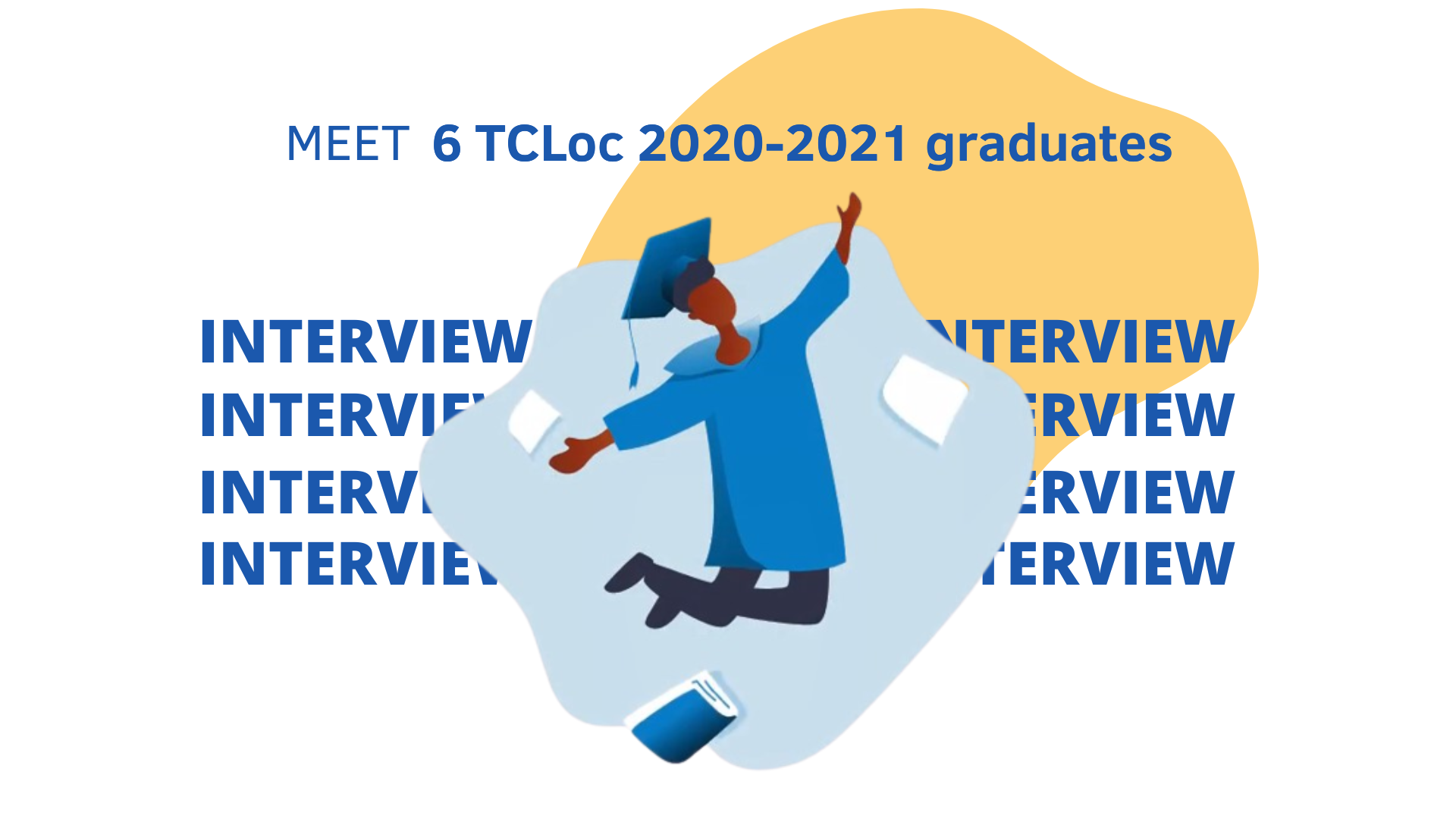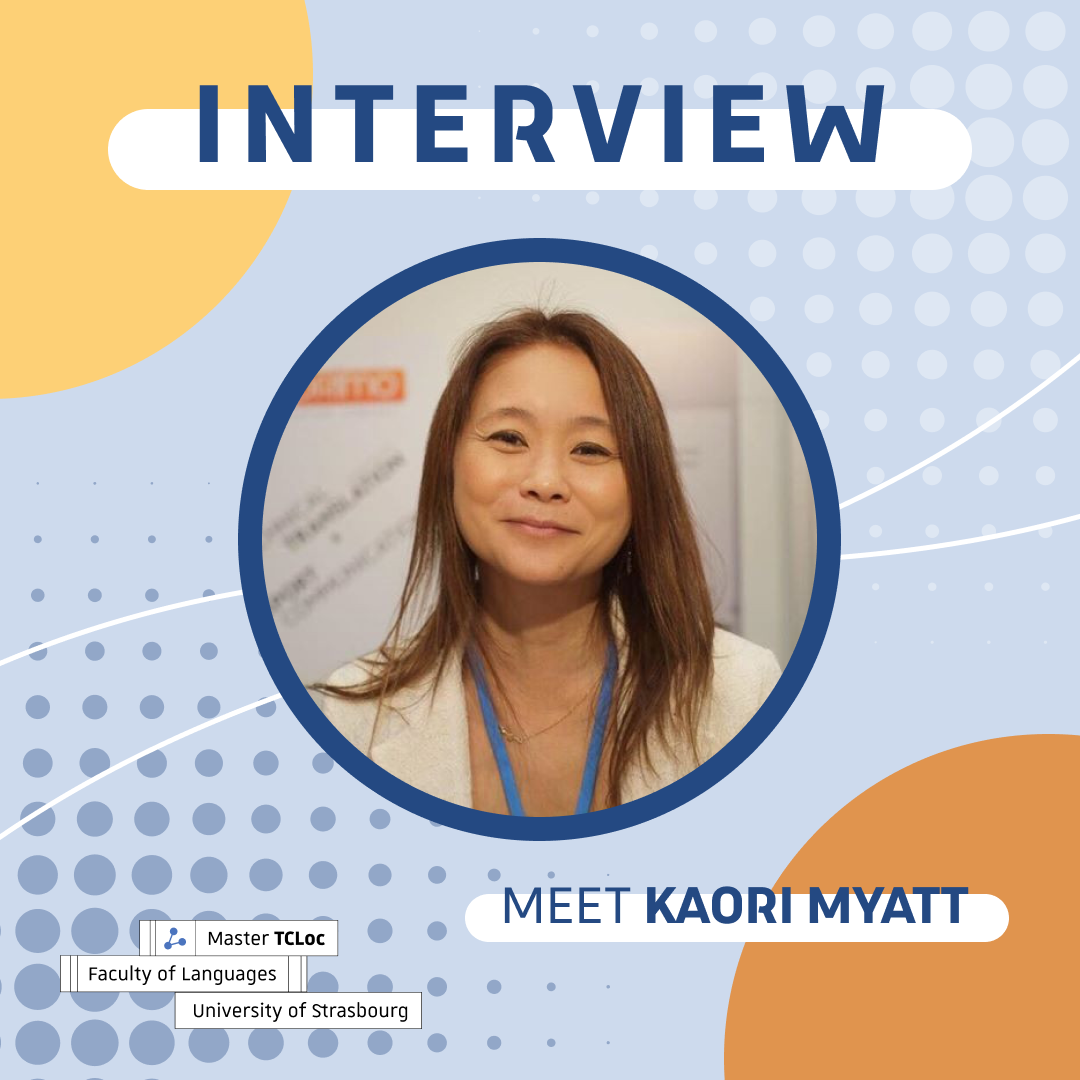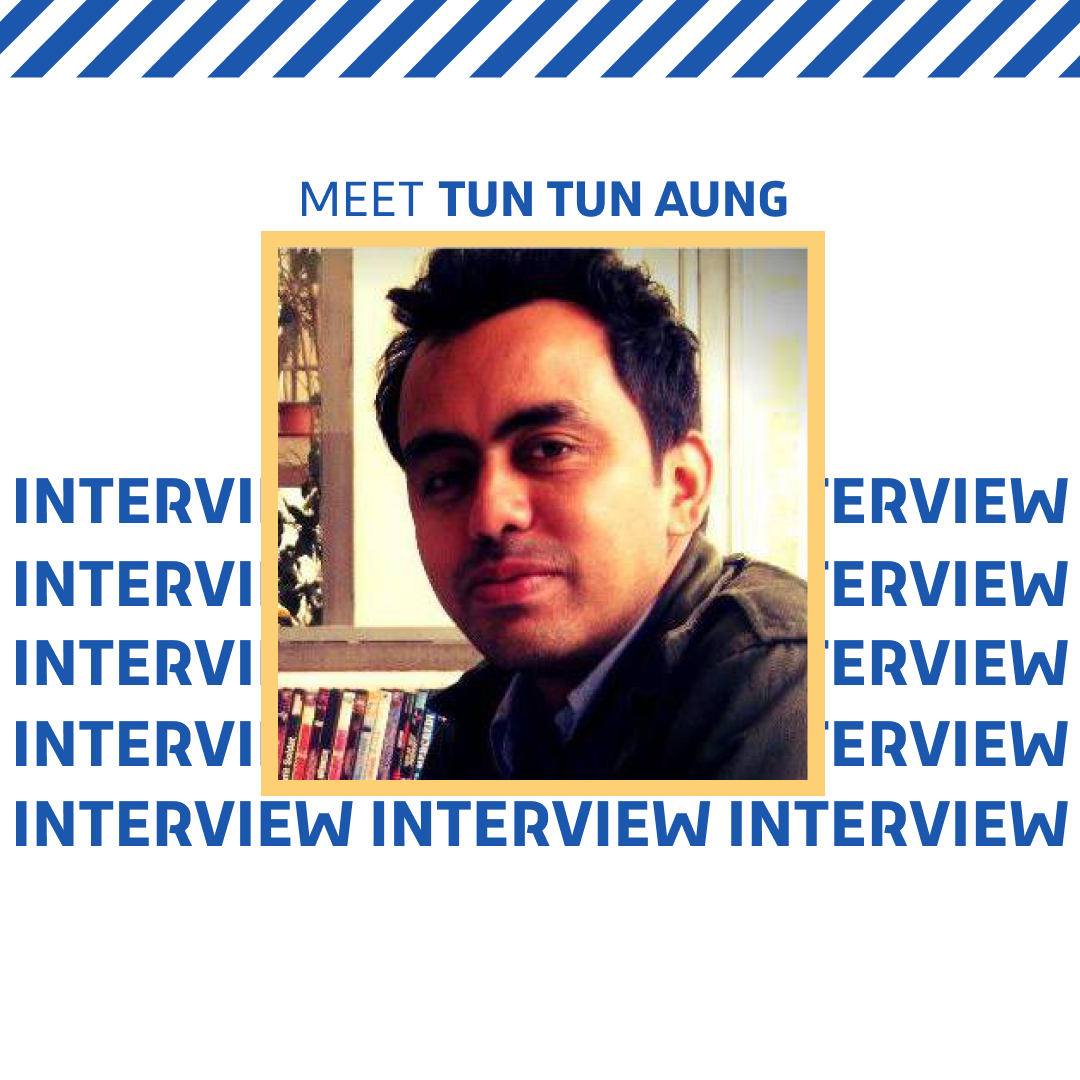With some delay due to COVID, graduating TCLoc students from 2020 and 2021 were finally awarded their diplomas on April 9, 2022.
The TCLoc graduation ceremony took place in the elegant European Doctoral College in Strasbourg. The graduates have been welcomed by Valérie Ledermann, training coordinator for TCLoc master’s, and congratulated by Dr. Rénate De La Paix and Drew Eisenhauer, heads of the program. They delivered a co-written speech mixing French and English to greet the graduates and remind them of the opportunities that now await them.
2020 and 2021 TCLoc’s students’ graduation ceremony: their feedback on the TCLoc program
This ceremony was a perfect opportunity to gather feedback from these graduates, including those who graduated in 2020 and who therefore have all the necessary distance to give informed feedback.
Here are the 6 questions we asked to 6 of the attending graduates:
TCLoc graduation ceremony : 6 questions, 6 graduates’ feedback
Can you introduce yourself and tell us what you did before applying to TCLoc?
Maiken Blok: “Absolutely! My name is Maiken Blok and I am 32 and I come from Denmark, I live just outside of Copenhagen. Before TCLoc, I was a technical communicator. I studied languages and organizational communication.”
Marielle Muschko: “I am Marielle I am 26 years old. I am from Germany, I currently live in Dresden (eastern Germany). I have also worked in France. So I am a little bit all over the place. Before TCLoc, I worked as a translator and as an interpreter as well. That’s about it.”
Dorian Cumberbatch: “My name is Dorian Cumberbatch and I am 42 years old. I am Cuban and I live in the US. So yeah, I came all the way here from the US! I have a bachelor’s degree in economics and I worked in translation and interpretation. By and large, I worked as a translator and interpreter before this program and recently I have been managing some projects.”
Joop Bindels: “I am Joop Bindels and I am 40 years old. I am originally from the Netherlands but I live in Belgium now. As for my job before the master, it’s the job that I’m still doing right now. I am a lecturer in translation technology.”
Rita Pang: “My name is Rita, I am currently 37 years old. My family has been living in Canada for the last 25 years but I’m originally from Hong Kong. It’s not very typical to go directly into a Master degree in North America, at least right after your bachelor degree. I had a ten year gap in between but I was a history and French student.”
Hanna-Katharina Meyer: “I’m Hanna-Katharina Meyer and I am now 43 years old. I come from Germany and I live in Bremen (northern Germany). Before the master, I was a freelance translator for English and the Scandinavian languages, Swedish and Danish, mostly”
What did you enjoy most about the program?
Maiken Blok: “The thing I enjoyed most about the program was probably the international aspects. We were so many different people actually gathering for the same interests, for the same learning purpose.”
Marielle Muschko: “I enjoyed the different insights on a lot of different fields. That had to do with technical communication, translation, localization, of course, and also project management.”
Dorian Cumberbatch: “That’s a hard one. I enjoyed a lot of things to be honest… I think the most important thing is that learning was fun. Because it’s one thing to feel like you’re learning something important, something that will have an impact on your life, but it’s much better when it’s in a really fun way. People share, they share their knowledge, or complaints. So it’s a lot of hard work but it’s a fun and useful experience”
Joop Bindels: “What I enjoyed most was the very detailed technical classes. Like, for instance, segmentation rules, stuff like that. That was new to me and quite interesting for me as a lecturer!”
Rita Pang: “I spent some time in Paris as an undergrad, so I always had this dream of coming back to a French academic space.”
Hanna-Katharina Meyer: “The program was extremely interesting and very challenging – I got so much out of it and I enjoyed the hard work because I learned so much. All of the students that I studied with, we were very, very close at the time and encouraged each other maybe on a daily basis even. That helped a lot.”
What do you plan to do now, or have already done with your degree?
Maiken Blok: “Well, actually, I graduated two years ago, and I have used my degree to get a promotion. So I am now a team manager for a team of writers. And I also used it as a sort of steppingstone to take on a bigger role in the Tekom community.”
Marielle Muschko: “Well, I actually already did something with it because I got connected with Victoria Gorskaya, a fellow student, and she introduced me to my current position. So this peer support system already helped me get a new job position, which is great.”
Dorian Cumberbatch: “I mean, not only that you have the master on your resume but you also feel way more confident because of all you have learned. And since even the students are professionals, you are even learning from the students, not only from the professors! Therefore, once you feel more confident you can take on more responsibilities and make more money. It feels good to know that now I can contribute more to my team, to my company.”
Joop Bindels: “Well, it allowed me to focus a bit more on research. I finished my thesis and that was a good starting point for doing more research in machine translation, for instance, and a lot of technical stuff that I use in my classes. Not copying it or anything, but I do use that knowledge that I learned here for my classes.”
Rita Pang: “I actually graduated about two years ago. I just came back for the graduation ceremony. I’m currently a technical writer for a healthcare company based in Canada.”
Hanna-Katharina Meyer: “First of all, I switched from being a freelance translator to working for a company. I was working as a freelancer for them before, but having a degree is probably one of the reasons why I also got hired. And I am sure that’s not the end of my journey. I would like to get back into digital accessibility more. I wrote my thesis about it. That is something I don’t work with at the moment and that is still at the back of my head. I could see myself developing into this kind of field more in the future.”
Can you describe your experience in one word or two?
Maken Blok: “Amazing”
Marielle Muschko: “Networking”
Dorian Cumberbatch: “Hard but fun learning”
Joop Bindels: “Very interesting”
Rita Pang: “Variety – in terms of managing your schedule, in terms of course, content, in terms of the people that you’re working with or learning from.”
Hanna-Katharina Meyer: “Outstanding”
What is the one thing you will remember most about the master?
Maiken Blok: “The one thing I will remember is the deep relations that I built with other people. Even though we were online, we actually managed to get a really good relationship with each other, and we helped each other out in every way possible.”
Marielle Muschko: “I think it’s Drew Eisenhower because he was the one that I had the most contact with. He is a very outgoing person, and he is really good at guiding you through your projects or through the program, I think. And another thing was that despite studying remotely, we had the WhatsApp group and opportunities to laugh with other people, which was great.”
Dorian Cumberbatch: “I would say the difference between the one I was when I started and the one I am now. Like, I could say: OK, it was worth the effort. It definitely feels good because you see the change.”
Joop Bindels: “I think I will remember Alex Zekakis’ classes. His classes were very inspiring, very interesting. So I will definitely remember those classes. Mark Nightingale’s classes too. He was very inspiring. Those two stand out for me, so I will definitely remember them.”
Rita Pang: “TCLoc is very much focused on trying to offer, you know, technical training for the world. For example, within the two year long program, I found the plain language and the technical English portion very, very helpful to get the job that I’m in right now.”
Hanna-Katharina Meyer: “One thing? The whole experience, including the students, the staff, Rénate, the encouragement, the lecturers. I can’t say it in one word. It’s the whole that has made most of the difference.”
What do you think TCLoc can provide in terms of expertise? Or in terms of opportunities?
Maiken Blok: “I definitely feel that the TCLoc program opens a lot of doors for people who are not necessarily part of the Tekom community or in the technical communication community already.”
Marielle Muschko: “It can provide you with a lot of different perspectives. I first started out as a translator, as I said before, and for example, I got into the IT department. That was so nice. It helped me understand how they work and what coding means. And this now helps me in my current position to really understand other departments.”
Dorian Cumberbatch: “Well, the easy one is as a project manager, that’s the first one that comes to mind. Now you can manage other people. You have more knowledge of the technical aspects, the management aspects. You have been learning with professors and students from all over the world so you feel more confident, more qualified to do this type of jobs and take a new step in your career”
Joop Bindels: “Well, for me personally, it hasn’t changed my work a lot. Well, it has opened up a few opportunities, but I think the program in itself can be very useful for a lot of students. The subject of technical communication and localization is not taught in a master program at that level. They sometimes are taught in small programs or in minors at universities, but not as a complete program in itself. I think that’s what is unique about it.”
Rita Pang: “I think this is a really great place for people who are coming from a literary background, who are trying to get into the technical world. There’s a big talent gap happening right now where companies are looking for talent all across the world but don’t know where to find them, whereas people coming from, for example, translation are trying very hard to get a better and more profitable career but don’t know where to start. So this is one of those programs that really help bring the two together and could be an excellent steppingstone if you’re looking for that change in your professional life”
Hanna-Katharina Meyer: “There’s something in it for everyone who is working within the language field, which is a very, very broad field. The whole program combines so many different areas that many different people can take something out of it. For example, I have never been very knowledgeable in programming and now I can read code and I know what to do with it. That’s very helpful for me: when I localize software, for example! So I think most people can benefit from the program.”
Thank you to all of you for your presence at this graduation ceremony and for your feedback about your experience with TCLoc Master!
Like them, take the plunge and apply for TCLoc now! We would love to hear about your experience with TCLoc one day! Next intake starts July 2022, more info right here: TCLoc Master’s Degree Online Application | TCLoc master’s (unistra.fr)



